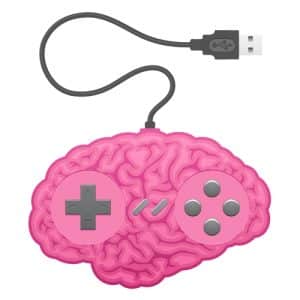
Research shows that challenging your brain as you get older can help prevent cognitive decline. One way to keep your brain active is to learn something new, like a different language, or engage in such activities as video games, which can promote more complex topics, such as detective work, creating new civilizations or traveling around the globe.
Research has found that video games have the potential to help seniors age more gracefully, keeping their minds sharp and responsive through game play.
Playing video games can actually be good for seniors in several ways, including improving memory, mood, and overall longevity.
Improve Memory/Sustain Attention Skills
Cognitive function often becomes impaired or begins to decline as we age, but keeping your mind engaged, stimulated, and active can help improve overall brain health. Video games can help keep the brain active and improve important cognitive functions, such as memory and the ability to pay attention.
Reduce Feelings of Depression
Older adults can get a mood boost from picking up a video game controller, too. It has been shown that seniors who played Nintendo Wii for an hour a week reported being in a more positive mood and having fewer feelings of loneliness than seniors who watched television for the same amount of time. Not only can seniors improve their physical function, but they are also increasing their opportunities for socialization.
Enhance Vision
Despite the common belief that screens hurt your eyes, video and computer games might actually improve your vision. A 2012 study published in “Seeing and Perceiving” has shown that seniors with cataracts who played first-person shooter games, such as Call of Duty or Halo, showed signs of improved vision, including making out small print and recognizing faces more easily. (http://psych.mcmaster.ca/maurerlab/Publications/Jeon_VideoGames.pdf) First-person shooter games force players to move their eyes quickly to track objects and react to sudden events in the game, and are also believed to increase dopamine and adrenaline, both of which help keep the brain active.
Hand-Eye Coordination/Reflexes
A variety of games, with different speeds, skills, and rules are good for healthy aging, as they use different parts of the brain and body. There’s a growing body of evidence that suggests playing video games actually can improve older adults’ hand-eye coordination, reflexes, reaction time, processing speed, memory, attention skills and spatial abilities. For example, research has shown that spatial visualization ability, such as mentally rotating and manipulating 2D and 3D objects, improves with video game playing. It’s not surprising that any physical activity that requires a high level of hand-eye coordination could stimulate our brains in a positive way, regardless of our age.
Exercise
There are sports games, such as Wii Sports, that require a good deal of spatial skills and some physical ability. For fitness video games, there’s the Wii Fit, a fun way to get exercise and perfect for seniors who can do yoga and other exercises to improve balance, all while standing in front of the TV.
Conclusion
Putting all the fun aside, using video games has shown remarkable health benefits for seniors. Seniors recovering from stroke have used video games and other virtual game systems to improve arm strength and regain physical function. Research links video game playing with improved cognitive skills and memory as the brain is challenged especially with the more complex games. Avanti Senior Living uses such games to help improve the cognitive function of their community. Residents have access to a variety of activity programs and amenities, such as computer games, WiFi, and hi-tech tablets, which are used to engage and entertain the residents.

